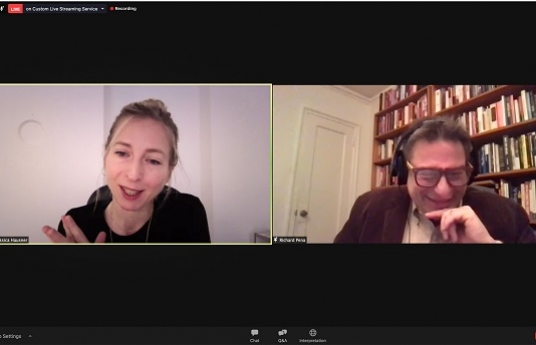Qumra Master Jessica Hausner describes the power of silence, visual styling and the depth of open-ended cinema
Mar 18, 2021

- Austrian filmmaker, whose films stand for defiant portrayals of female protagonists, says she likes to create a sense of mystery and leave questions unanswered with her films
Doha, Qatar; March 18, 2021: Qumra Master Jessica Hausner, the renowned Austrian filmmaker who had her breakout moment with her second film Hotel, which screened in the Un Certain Regard section at the 2004 Cannes Film Festival, likes mystery to linger in her films. The sense of the unknown, the unanswered questions and an almost deliberate effort not to tie up all those knots – a conventional film approach – make her films ideal lessons for emerging filmmakers.
The quest for questions indeed was a recurring element of her masterclass at Qumra, the Doha Film Institute’s annual talent incubator for Arab cinema. Being open-ended, being unpredictable, not knowing it all, she says, is also what life is about. But it is not a visceral approach to human frailties and fears that make her films stand-out: it is in her approach to visuals, structured almost like the paintings she would see at museums with her painter father, Rudolf Hausner.
She recalled studying a painting on a vacation to Madrid with her father detailing the different layers and dimensions, revealing almost ten stories in one illustration of a battlefield. “I think my whole attraction to composition was probably formed back when I was a child. Art shows an alternate perspective on reality and makes normal things look different. The whole story-telling lies within the composition and colours of those frames.”
Hausner brings out the same flourish in her frames, such as in Amour Fou, also screened in the Un Certain Regard section at the 2014 Cannes Film Festival, and in Hotel. She was also inspired by the conversations at home about cinema and art, with her father introducing her to the works of Ingmar Bergman and Akira Kurosawa. “My father loved the visual elements of Kurosawa’s films, who was a painter himself in the beginning.”
She started pursuing cinema seriously by setting up the production house coop99 along with friends. “When i started filmmaking in the 1990s, Vienna did not have a strong film industry. The films were made for a predominantly Austrian audience. Michael Haneke’s The Seventh Continent came as a revelation; it was incredible that an Austrian filmmaker was doing arthouse cinema with international resonance.” For Hausner, the goal was to create films for an international audience. “[With the production company] we made sure that the original film language in our head was not to be altered or influenced by producers who didn’t really share our same aim.”
Taking a leaf from Haneke, her advice to young filmmakers is to “have an original [cinematic] language of your own and find a way to make it accessible to an audience.” She realised this with Hotel, about a young woman who goes to work at a deserted hotel where her predecessor had disappeared mysteriously. The stylistically striking film drew majestically on the beauty of silence – with intention.
“There is always an unspoken layer in my films: In Hotel, for example, the girl, a curtain and the staircase are all characters. Of these three, two cannot talk. I have always been interested in studying more of what we think is normal and have always wanted to create a strange, unknown, uncanny atmosphere. After all, if you stop talking and listen around, you will find strange noises, and those are part of what inspires my imagination,” said Hausner.
With every subsequent film, Hausner has kept the spirit of mystery alive, underlined by her outlook that “I don’t give away what you want to know.” She compares that to life: “We would like to know what life is like, but we don’t know. I try to put that in my films. I want to tell my audience that you really don’t know what is true or false and still have them engaged in a way that satisfies them in the end.”
Public can access Qumra online by purchasing a Qumra Pass that offers the full Qumra Screenings and Qumra Talks programmes. Qumra Pass is open to all citizens and residents of Qatar and the MENA region, and applications will be processed on a first-come first-serve basis. The Qumra Pass is priced at QAR 500; students and Culture Pass by Qatar Museums holders can purchase it for a discounted price of QAR 350.